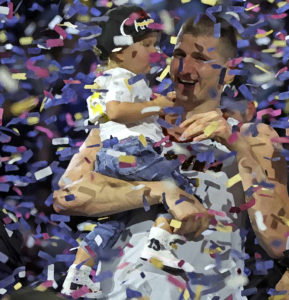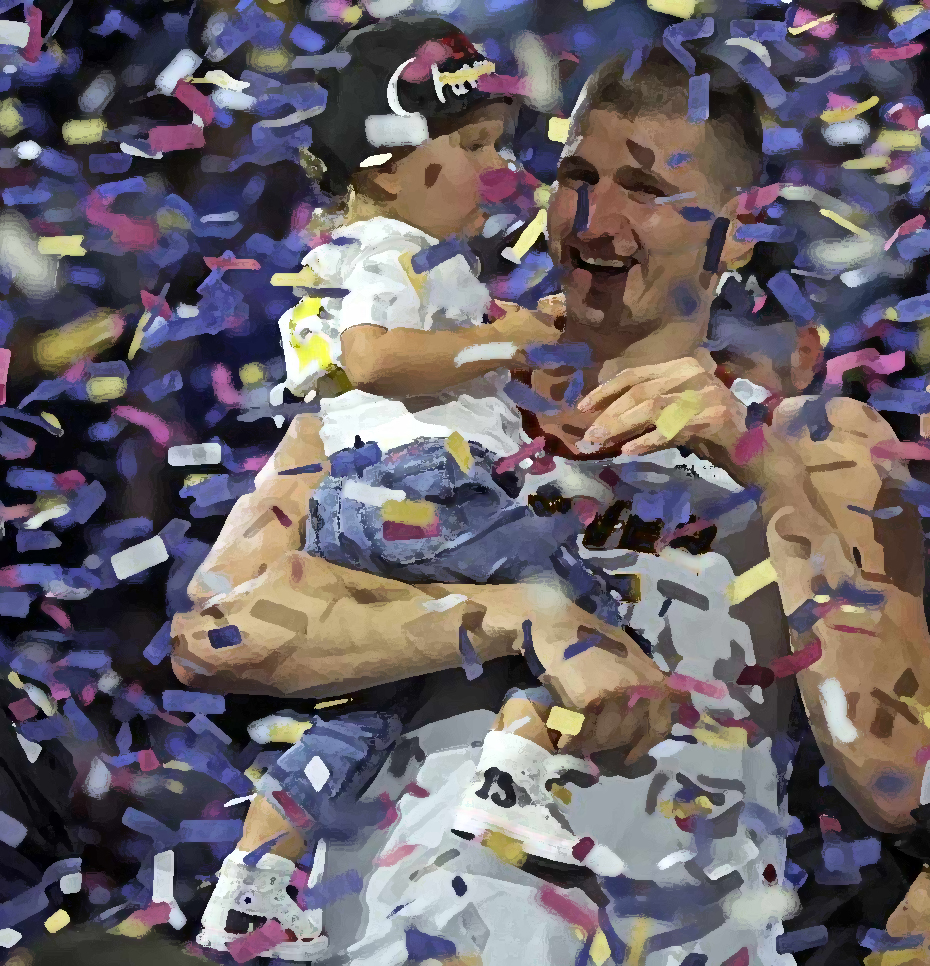#25 IN PRAISE OF THE JOKER

Nikola Jokic and daughter in the championship confetti
The first time I watched Nikola Jokic play a few years ago, he came off the bench, replacing Jusuf Nurkic as center for the Denver Nuggets. The Nuggets got the ball and went on offense, where Jokic situated himself at the foul line. With one flip of the ball over his head, it flew over the back of a cutting guard to land in his hands, in perfect position to make a lay up. I practically shot out of my seat! That was one of the slickest, most unlikely passes I’d ever seen. He did the same thing again, a couple minutes later, to a guard cutting in the same way on the opposite side.
Eventually the league would have to try and catch up with his uncanny abilities, and figure out how to guard those passing lanes, but that meant you had to either double him to force the ball from his hands, or leave him in single coverage, and virtually no one can cover him one on one. He’ll take them to the basket where he finishes with amazing proficiency. It often looks like he’s moving through molasses, but with faultless footwork, he finds the angle, flips the ball up with an amazingly sensitive, soft touch—and other huge guys draped on him–and then the rest of us get to watch it roll on the rim and drop through the hoop.
If that’s all he did, he’d be making a lot of money in the NBA. He recently signed the highest paying contract in the history of the NBA.
Monday night his team won the championship for the first time in its 47 years in the NBA (it had never seen the finals), beating the Miami Heat 4 games to 1. It’s something I always like to see, despite it coming at the expense of someone else: thousands of wildly ecstatic people. You just never see a lot of people that happy normally. But Jokic, having finally surmounted Mount Everest, seemed fairly equanimous in his response. When asked about it later, he said something to the effect that his mother had told him not to get too excited when he won, and not to get too down when he lost.
Michael Jordan spent a number of frustrated years getting bounced from the playoffs precisely because it wasn’t enough to be the best player of his generation or of any generation. No player, no matter how great they are, can win a championship without a quality team around him or her (and LGBTQetc.), a great coach, and a sound, forward-thinking organization, which is exactly what the Nuggets have now. They built this team gradually, trusted the evolution of its key human parts, drafted and traded until suddenly…they had something dangerous.
No small part of that stemmed from Jokic learning he had to evolve out of his 300 pound, pudgy body into a more svelte (I don’t know if that’s the right word for his big ole physique), well-muscled man who could hold up under 44 minute a game finals usage. As I didn’t know until a few days ago, he played water polo in his youth, and got used to faking and passing with the ball above his head. (Nuggets fans remain indebted to the Serbian love of water polo.) By itself, that doesn’t explain his wondrous skill in passing, but it shows where his training began. And if you keep the ball above your head, it’s a lot harder for people to strip it from you.
Passing constitutes his most distinguishing feature as a Big Man. It’s not farfetched to compare him to Magic Johnson, who got that nickname from his passing skills. This isn’t what you expect of centers, including many of the best ones. When asked about passing, Jokic likes to say, “If I score, that makes one person happy. If I throw it to someone else who scores, it makes two people happy.”
It’s here we start to see a more unique quality to Jokic that does in fact elevate his game. He literally does not evaluate the game according to his stats, which, it turns out are gaudy—gaudy enough to share company on the record lists with the greatest names who played in the NBA. To take a couple of small examples, Jokic had 9 triple-doubles (double figures in scoring, rebounds, and assists) in a single playoff run, setting the record. Who’s record did he surpass? Wilt Chamberlain’s 7. Here’s another: he recorded 30 points, 20 rebounds, and 10 assists in a finals game. Who’s record did he break? No one’s. No one has ever done that. He’s the first player ever to lead everyone in the playoffs in total scoring, rebounds, and assists.
The poor guy (actually, as I’ve made a point of, he’s very well-paid) seems constitutionally beleaguered by the side of his job that requires him to relate to the media, meaning he gets endless questions about being MVP (of the league twice, and of the championship series once—more on that below) and the various dominating statistics, and with practiced patience he tells one interviewer after the next that he doesn’t care about stats or MVP trophies. He likes playing and winning games. He pointed out to Lisa Salters (the ABC sideline reporter) that the Nuggets’ struggles in the first half of Game Five, perhaps due to nerves, were what made basketball fun. You can’t predict what’s going to happen, he said.
Thus the ultimate dimension of Jokic’s game he premises on that very unpredictability. He comes down the court, reads the defense with extraordinary quickness and precision, and reacts spontaneously to what it presents, therefore proceeding without a plan or even an interest in getting up his own shots. Sometimes he barely shoots at all for a whole half. Sometimes he’s taking the ball hard to the basket practically every time it comes to his hands. He’s reading who’s guarding whom, where the mismatches are, where the open players are or, more importantly, could be. The pinpoint passing becomes infectious as a group, i.e., the other players want to make great passes and don’t just stew over how many shots they get. The selflessness of the leader becomes the selflessness of the team. (Hey, leaders in Washington, are you reading this?)
Jokic didn’t just lose weight and gain muscle in his evolution as a ball player. He developed an extraordinarily various shot selection around the basket, a proficiency for mid-range jumpers (not that he jumps very high), and this year shot 46% from the three point line in the playoffs. Oh, and for some reason this does seem to apply to some of the great rebounders (Bill Laimbeer comes to mind), he’s an excellent rebounder though he can’t jump.
I could go on praising his fine points. Throughout the season, he had risen to first in the MVP consideration yet again, and if you ask me (no one has, but you’re getting it anyway), he fully deserved it, especially now in light of carrying his team all the way to the Promised Land. Kendrick Perkins, retired center and basketball commentator, weighed in this past spring that white Jokic didn’t deserve the award, and that it was a product of racism on the part of white sportswriters and broadcasters who vote. Some accused him—absurdly—of “stat stuffing,” meaning he just racked up stats disconnected from the good of his team as the “selfish superstar.” Joel Embiid started beating his chest about winning the award, while the Nuggets struggled as a team at the end of the season (described in blog #19). Embiid, a great center and a black player, who did outplay Jokic in their one face to face battle this season, successfully got the votes. Nevertheless, it’s Jokic, not Embiid, who got his team to the finals and beat the Miami Heat when he faced them.
And here I am, finally having to confront life without basketball for a few months, like an alcoholic who shot down his last drink. Cold turkey will have to battle my championship afterglow, but it all fades in the end. Nevertheless, I go into the bleak months of the baseball season with some abiding memories of Jokic holding his baby daughter in a storm of confetti or jumping up and down with his Serbian brothers (who came out here to live with him in his early and no doubt somewhat lonely expat days) or the people in his small hometown of Sombor (where everyone knows everybody) showing up to the local gym to watch him together in the middle of the night. Point guard Jamal Murray wept, after a brilliant and often electrifying playoffs, triumphantly returned from a terrible ACL injury. Head Coach Michael Malone, tirelessly preaching disciplined play, exertion, and defense, finally got it all from his team at a superlative level as they blew through each opponent they got.
But the team’s been on Jokic’s shoulders the whole way and for a number of years now. He’s the one who’s in the weight room after the game lifting. He’s the one who perfected so many kinds of shots that you have to guard him everywhere. He’s the matrix for fluid passing and the one who holds down the fort at the defensive end. He’s striven to perfect his game, while wanting nothing to do with the credentials or awards or big ego that comes with it all. Malone says he hasn’t been changed by his success; his personality remains refreshingly down to earth, humorous, and understated. Sports writers have come around to calling him “the best basketball player in the world,” and we can argue about that still, perhaps, but he’s probably the least puffed up one and, ironically, since so much success has started pouring down on him, he’s done it with a genuine degree of selflessness (who knew?). That could give a whole new meaning to “best basketball player in the world.”

Jokic/Murray mural in Denver


Growing up in Colorado, the Nuggets were always a laughable team. When commentators questioned Jokic being deserving of an MVP, I wished I could impress on them the sheer improbability that the Nuggets were now this good. Forget that he averages a triple double. The Nuggets. Are the Best Team. (Head exploding noise…)
I think all this has finally, genuinely changed. And now…everyone will be gunning for the Nuggets.
Thanks for this blog Gary. Finally, after all these years, it’s fun to watch the Nuggets.